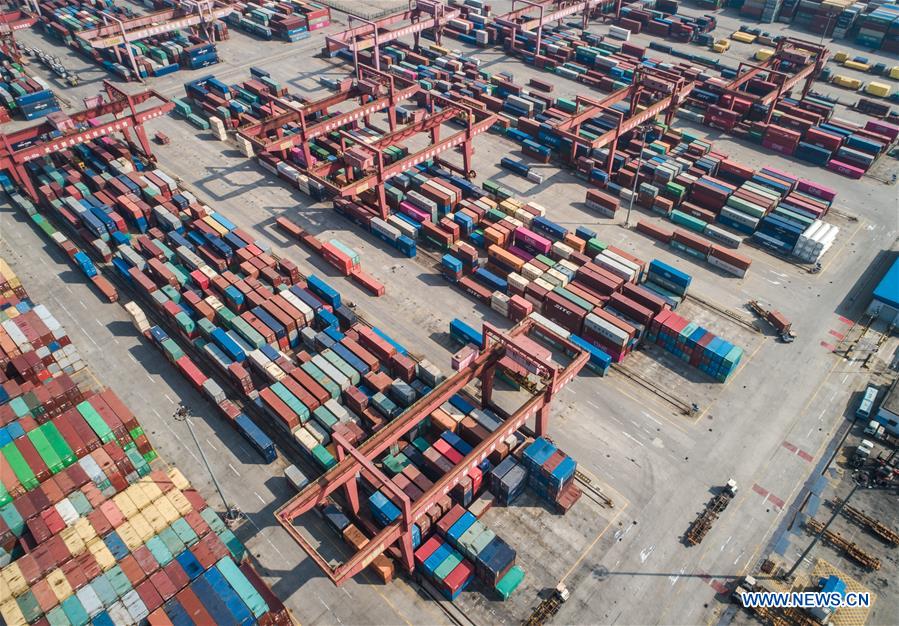Wuhan begins economic reboot
- By Qin Qi
 0 Comment(s)
0 Comment(s) Print
Print E-mail China.org.cn, April 16, 2020
E-mail China.org.cn, April 16, 2020

On April 8, Wuhan lifted its 76-day lockdown since the onset of the COVID-19 outbreak. As people's lives gradually return to normal, the city is using various means to save and restart its economy.
The city in central China is the country's Motor City. About one fourth of its local GDP comes from the automobile industry.
Dongfeng, a Wuhan-headquartered automaker, reportedly saw a record 43.6% contraction in output and 34.2% reduction in sales from January to February.
Economic indicators released by local authorities show significant downturns in Wuhan's overall economy in the first two months of this year. The added value of industrial enterprises above designated size dropped by 32.6% year on year, total retail sales of consumer goods contracted 42.1%, and fixed investments plummeted 72.9%. Some analysts said the pandemic cost the city over 200 billion yuan (about US$28 billion).
On the same day the city lifted outbound travel restrictions, it held an investment signing ceremony online, participated by city officials in Wuhan and executives from a number of major companies.
"All industries in Wuhan are waiting to be revived after the 'reboot'. The city is rapidly regaining its vigor," said Wang Zhonglin, secretary of the Wuhan Municipal Commission of the CPC.
Two days later on April 10, a major projects commencement event was held online, and the city announced the launch of 100 key projects worth a total of 186.57 billion yuan. The projects cover key industries such as information technology and automotive, as well as areas including infrastructure construction, education, public health, and so on. An official of the municipal development and reform commission revealed that 1,326 projects - each worth 100 million yuan or more - are under construction this year, totaling a whopping 2.9 trillion yuan.
Apart from making big-ticket investments, the city is also partnering with e-commerce giants to revive its economy. China's three biggest e-commerce companies - Alibaba, JD.com, and Pinduoduo - have launched programs to support the sales of agricultural goods from the city and the entire Hubei province.
A strategic cooperation agreement between Pinduoduo and the Wuhan municipal government was reached the day the city reopened on April 8. Named the "Wuhan Selective Products Zone," the program aims to leverage Pinduoduo's massive platform to promote agricultural products in Wuhan to the national market.
"The new type of e-commerce platforms help companies in Wuhan to resume production through innovative means, and rapidly open online and offline sales channels for the city's agricultural products," said Shan Lipo, an official from the Ministry of Industry and Information Technology, during the signing ceremony. "This comes in the right time and will have profound significance."
In addition to revving up economic engines, Wuhan is also lending financial help to companies, especially small businesses, which are generally believed to be hit hardest by the outbreak. In late March, before the city lifted outbound travel restrictions, the city announced 21 measures to facilitate work resumption, including providing interest-free loans to all small businesses. Days later, on April 12, an official of the city's agricultural authorities said the city is aiming to raise 1 billion yuan to help 439 micro-, small-, and medium-sized agricultural companies.
With the coronavirus epidemic effectively being contained in the city, work resumption has accelerated noticeably. Currently, 95% of primary suppliers of auto parts have resumed work in the city, and 97.2% of major industrial enterprises have resumed production. In the service industry, 93.2% of major service enterprises have resumed work.
"The risks of Wuhan's socioeconomic downward trends are decreasing," said Mei Xinyu, a researcher at the Ministry of Commerce. He called for more national support in medical equipment, automobile, and information technology to revive Wuhan's economy.






Go to Forum >>0 Comment(s)